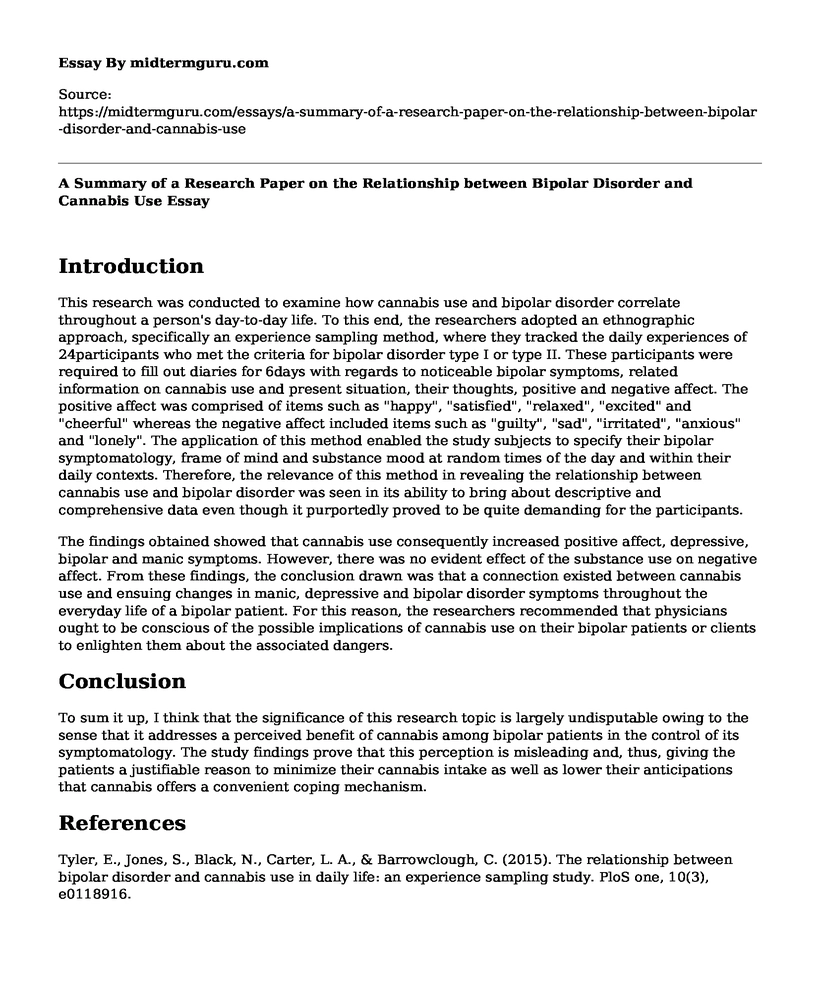Introduction
This research was conducted to examine how cannabis use and bipolar disorder correlate throughout a person's day-to-day life. To this end, the researchers adopted an ethnographic approach, specifically an experience sampling method, where they tracked the daily experiences of 24participants who met the criteria for bipolar disorder type I or type II. These participants were required to fill out diaries for 6days with regards to noticeable bipolar symptoms, related information on cannabis use and present situation, their thoughts, positive and negative affect. The positive affect was comprised of items such as "happy", "satisfied", "relaxed", "excited" and "cheerful" whereas the negative affect included items such as "guilty", "sad", "irritated", "anxious" and "lonely". The application of this method enabled the study subjects to specify their bipolar symptomatology, frame of mind and substance mood at random times of the day and within their daily contexts. Therefore, the relevance of this method in revealing the relationship between cannabis use and bipolar disorder was seen in its ability to bring about descriptive and comprehensive data even though it purportedly proved to be quite demanding for the participants.
The findings obtained showed that cannabis use consequently increased positive affect, depressive, bipolar and manic symptoms. However, there was no evident effect of the substance use on negative affect. From these findings, the conclusion drawn was that a connection existed between cannabis use and ensuing changes in manic, depressive and bipolar disorder symptoms throughout the everyday life of a bipolar patient. For this reason, the researchers recommended that physicians ought to be conscious of the possible implications of cannabis use on their bipolar patients or clients to enlighten them about the associated dangers.
Conclusion
To sum it up, I think that the significance of this research topic is largely undisputable owing to the sense that it addresses a perceived benefit of cannabis among bipolar patients in the control of its symptomatology. The study findings prove that this perception is misleading and, thus, giving the patients a justifiable reason to minimize their cannabis intake as well as lower their anticipations that cannabis offers a convenient coping mechanism.
References
Tyler, E., Jones, S., Black, N., Carter, L. A., & Barrowclough, C. (2015). The relationship between bipolar disorder and cannabis use in daily life: an experience sampling study. PloS one, 10(3), e0118916.
Cite this page
A Summary of a Research Paper on the Relationship between Bipolar Disorder and Cannabis Use. (2022, Sep 10). Retrieved from https://midtermguru.com/essays/a-summary-of-a-research-paper-on-the-relationship-between-bipolar-disorder-and-cannabis-use
If you are the original author of this essay and no longer wish to have it published on the midtermguru.com website, please click below to request its removal:
- Prosocial Motives, Emotions and Behavior
- Racial Segregation: Research Proposal
- Definitive Essay on Gender Inequality
- Essay Sample on Drug Addiction, Causes, and Effects
- Drug Abuse & Overdose Death Rates Rise in US - Essay Sample
- Amanda Todd's Story: Struggling, Bullying, Suicidal, Self-Harm
- What Makes Me Unique - Essay Sample







